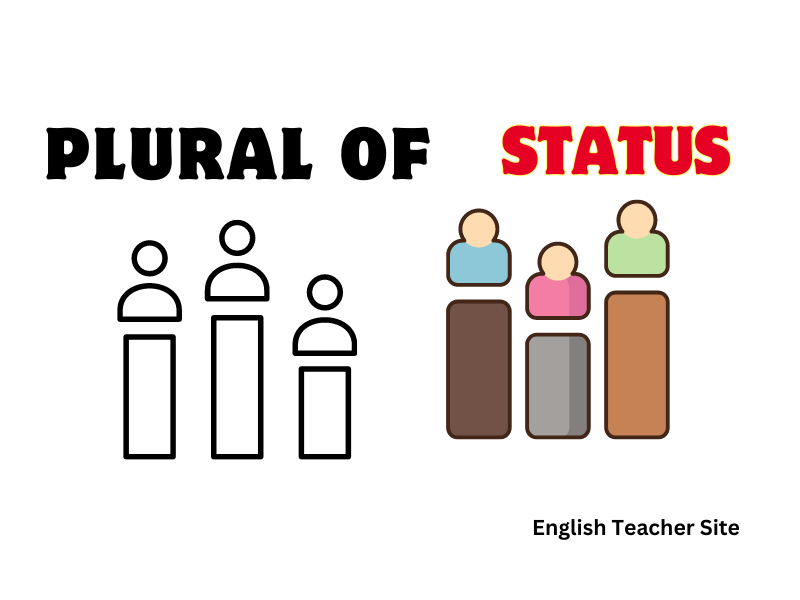What’s the Plural of Status: Understanding Singular and Plural Forms

- “Status” can be pluralized as both “statuses” and “status.”
- The two plural forms of “status” reflect its Latin roots and English adaptation.
- Understanding when to use each plural form depends on context and preference.
Determining the plural of “status” can be perplexing due to its Latin origin. While many English words follow simple pluralization rules, such as adding an ‘s’ or ‘es,’ words from Latin can have irregular forms. The interesting aspect about “status” is that it is accepted in two different plural forms. This has led to varying usage in different contexts, leaving many second-guessing the appropriate application of the word in its singular and plural forms.
What’s the Plural of Status?
There are two acceptable plural forms for the word “status.”
The first form maintains the singular spelling, “status,” which reflects the zero plural commonly found in the original Latin. The singular and plural forms are pronounced differently, with the plural often having a longer final syllable.
The second, and more commonly used form in modern English, is “statuses,” which conforms to the regular pattern of adding “-es” to the end of nouns that end in “-us.”
| Singular | Plural |
|---|---|
| status | status (zero plural) |
| status | statuses (regular plural) |
Examples of Usage:
- The project manager asked for updates on the status of all ongoing projects.
- The company’s social media team tracks the engagement statuses of their posts.
The plural of “status” might be clearer when seen in the context of sentences:
- Whether a person owns a car can influence their social status.
- The survey responses revealed various economic statuses.
Singular Form of Status
In English, the singular form of the word “status” remains unchanged whether used in a singular or plural context.
Characteristics of the Singular Form:
- It refers to an individual’s social or professional position.
- Used to describe legal standing.
- Applied in a variety of contexts including social media.
| Usage Example | Context |
|---|---|
| The patient’s health status is stable. | Medical/Health |
| Her marital status changed recently. | Legal/Marital |
| What is the server’s status? | Technology/Operation |
Common Considerations:
- Status can be confusing given it does not change form like most English nouns.
- Stylization and context will determine its application.
| Singular Form | Appropriate Use |
|---|---|
| Status | When referencing one item, individual, or case |
Meaning of Status
The term status signifies an individual’s or entity’s position relative to others, indicating rank or standing within a given context. In various social and professional settings, status reflects on one’s prestige or hierarchy. It often denotes a person’s rights, responsibilities, and lifestyle in sociological terms, embedding societal values and norms within its definition.
Status can also reference the legal or professional state of an individual or an object. For example, in a legal context, one might inquire about the status of a case or the marital status of a person. In a professional setting, the status of a project or an employee’s work might be discussed. These applications highlight its role in conveying the conditions or progress of different subjects.
| Latin Root | English Equivalents |
|---|---|
| Status (singular) | Status / Statuses (plural) |
| Cactus (singular) | Cacti / Cactuses (plural) |
- Status (plural: status / statuses) is used to express:
- The standing of an individual within a social or professional hierarchy.
- A legal or official condition.
- The state of affairs in a particular circumstance.
Other Latin Nouns
English, replete with words of Latin origin, often requires knowledge of Latin grammar to pluralize them correctly. These nouns have unique plural forms that deviate from the standard addition of an -s or -es suffix found in English.
When teaching the plurals of Latin nouns, one first encounters words like curriculum, which in the plural form becomes curricula, not curriculums. Similarly, datum transforms into data when referring to multiple pieces of information.
Latin Nouns Ending in -um
| Singular | Plural |
|---|---|
| curriculum | curricula |
| datum | data |
| bacterium | bacteria |
These words highlight the rule: replace -um with -a to form the plural.
Latin Nouns Ending in -us
Next, consider nouns that terminate with -us. The transformation often involves replacing -us with -i.
| Singular | Plural |
|---|---|
| alumnus | alumni |
| focus | foci |
| radius | radii |
However, some nouns have been Anglicized, allowing for the simple addition of -es. For instance, bus becomes buses rather than the Latin bi.
Nouns with Irregular Plurals
Certain Latin nouns have irregular forms in the plural:
- Appendix, from medical and scholarly contexts, can be pluralized as appendices.
- Matrix finds its plural in the form of matrices.
- Vertex ends up as vertices when discussing multiple angles or corners in mathematics and geometry.
Sentences with the Word Status
In singular form:
- The status of the project is currently under review.
- She takes pride in her status as a published author.
In plural form (using “statuses”):
- The human resources department monitors the employment statuses of all employees.
- Multiple systems can have various operational statuses at any given time.
Here are examples arranged in tables detailing usage in different scenarios:
| Singular Usage | Plural Usage (Statuses) |
|---|---|
| The device’s status. | Comparing two devices’ statuses. |
| A VIP’s special status. | All VIPs have different statuses in the system. |
- Status as a singular noun:
- The school’s accreditation status is outstanding.
- “Statuses” as a plural noun:
- All candidates’ application statuses will be updated by tomorrow.
Application Examples of Status/Statuses
When dealing with legal documents, “status” remains unchanged.
- Legal Status:
- Refugee status
- Marital status
- Employment status
In social media contexts, “statuses” is commonly preferred to refer to multiple updates.
- Social Media Updates:
- Facebook statuses
- Twitter statuses
- LinkedIn statuses
Consider the difference in the following scenarios:
| Singular | Plural |
|---|---|
| A project’s status | Projects’ statuses |
| A shipment’s status | Shipments’ statuses |
| One person’s status | People’s statuses |
Academically, the term “status” can be used in both singular and plural forms depending on the context and its precedents.
- Academic Contexts:
- Species’ status
- Students’ socioeconomic status
- General Discourse:
- “Please update me on the statuses of the ongoing projects.”
Origin of the Word Status
The term status has its origins steeped in Latin. Initially, it denoted the standing or state of something, largely used in a legal or social sense. In modern English, the word has been adopted with much of its original meaning intact. It refers to a person’s social or professional position, the condition of affairs, or a legal standing.
| Latin | English Equivalent |
|---|---|
| Status (singular) | State or condition |
| Status (plural: stati) | States or conditions |
Key Features of “Status”:
- Latin Root: The word “status” is unaltered from its Latin form.
- English Adaptation: In English, the word is used both in singular and plural forms, often without changing its ending.
- Regular Plural: Despite its Latin origin, the word commonly adopts the regular English pluralization, becoming “statuses”.
English Adaptations:
- statuses: Common plural using English rules
- status: Used as a plural in specific contexts, maintaining the singular form
Sources
My name is Khamis Maiouf. I am the creator of the English Teacher Site, dedicated to providing valuable resources and insights for students around the world. With a passion for education and a commitment to helping students enhance their skills, I aim to make English teaching more effective and enjoyable for both educators and students.






